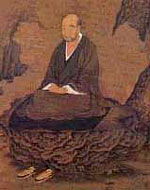Koso Wasan 29
On reaching the age of sixty-seven, his time come,
He attained birth in the Pure Land;
There were then wondrous, auspicious occurrences,
And monks and laity all venerated and took refuge in him.
Wondrous, Auspicious Occurrences

The frequent references to 'wondrous, auspicious occurrences' (reizui fushigi - 'inconceivable wonders') in Buddhist texts is an important reminder of the nature of the core reality, which the dharma both proposes and knows. This, of course, is tathata, usually translated as 'suchness'. It is the absolute, the all pervading wisdom. It is also known as the unconditioned, dharma body, self, prajña, buddha, shunya ta, and so on. Since it is unconditioned - without either beginning or end - it plays within conditioned existence in the way that we can feel vibrations from a stringed instrument. It does not alter the course of events or violate the law of karma.
People who have been raised within the context of western culture find 'wondrous, auspicious occurrences' hard to accept. In my view, this is because of the prevailing materialistic and sceptical ethos in our time; but it is only a prejudice. This prejudice of ours really just signifies our unenlightened state. The fact that I do not see 'wondrous, auspicious occurrences' - for example, the eighty-four marks of a Buddha - does not negate their reality. It is absurd to say that something does not exist because one does not understand or see it. This is like saying that the sun does not exist because it is midnight. Radio waves are not visible - they are a form of light, after all - but until relatively recently they were not known to exist.
Although the dharma respects 'wondrous, auspicious occurrences', they are always only extensions of things as they are, consistent with the natural order - as when an earth tremor shakes a forest. The cause may be radical but it is not unnatural. The supernatural is still 'natural', so to speak. It is only because wondrous signs are beyond the reach of small, self-centered and unenlightened minds that they are inconceivable.
In this sense, the dharma repudiates miraculous intervention in order to bring about the salvation of suffering beings. The law of karma is inviolable. Although, to our minds, events like the birth of Shakyamuni, the influence of the gods upon his career - and the way the earth shakes, music plays and banners stream across the sky whenever a sutra is expounded - sound miraculous at first glance, they are only so to limited, materialistic and unenlightened minds.
Wondrous, or inconceivable signs, do not occur to overawe us. They are not mere spectacles, like the openning of the 2000 Olympic Games in Sydney. Their purpose is not to convince us of the truth of the dharma by dramatising a story; they are neither a matter of public relations nor proof of anything that is ultimately beyond our reach. If we think carefully about such events when they are reported in accounts of the lives of Buddhas or great and accomplished followers of the dharma we realise that they all have one, strong and prominent characteristic.
When Shakyamuni had finished delivering the Larger Sutra, those who heard him were enlightened. Then
the entire universe of a thousand million worlds shook in six ways, and a great light illuminated all the lands of the ten quarters. A hundred thousand kinds of music played spontaneously, and innumerable marvellous flowers fell in profusion from the sky.1
What this and all similar passages convey is, in fact, harmony. The wondrous signs at the time of T'an-luan's entry into the Pure Realm tell us the same story. Although they are not designed to convince us of anything against our will, they do testify to the fact that a great natural event has occurred; that something remarkable has happened at the heart of things, something has stirred within the dharma body.
The wondrous, auspicious occurrences are quiet, calm, serene, and pure; as when whisps of cloud at sunset simply serve to enhance the beauty of the sky at the end of a glorious day.
1: TPLS2, p. 70f.